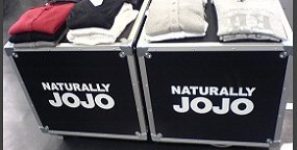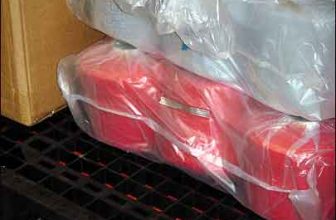
Deepen the application of RFID to ignite the flames of business opportunities for the apparel industry
[ad_1]
Established in 1984, Liyi Apparel Industry Co., Ltd. formally established the NATURALLY JOJO brand in 1994. After more than ten years of hard work, it is now a well-known apparel industry with 60 business locations in Taiwan and well-known at home and abroad. In order to deepen the brand value, NATURALLY JOJO cooperated with Addison Technology in 2008 to participate in the “RFID Smart Display Display Sales Service Plan” of the Commercial Department of the Ministry of Economic Affairs, hoping to use new technology to improve business processes.

Qiu Guancheng, deputy general manager of NATURALLY JOJO, said that the company has been paying attention to RFID four years ago. In addition to researching related technologies and applications, it also participated in government project applications. Although it was not subsidized at the time, the company’s management class was very sure that RFID was used in the business link. Possibility. Qiu Guancheng believes that factors such as the scale of the company and the concept of operators have made the apparel industry unfamiliar with the concept of e-commerce, and its practice is relatively conservative. Relatively speaking, JOJO’s management class has attached great importance to the information environment from the early stage, not only introducing suits in 2000 ERP, and then continue to update corporate websites, internal MIS systems, invoicing systems, and even when the industry generally adopts a closed point-of-sale system (POS), they cooperated with information service providers to develop Windows-interface POS. The business class has the courage to To try new things is to create more possibilities for the company’s operations.

Figure 1: NATURALLY JOJO, who has always had a lot of ideas for e-business, has also been ahead of its peers in the introduction of RFID.
Hope to improve the brand value and service depth. (Provided by NATURALLY JOJO)
However, it is impossible for companies to introduce new technologies rashly in order to try new things. Investment in RFID is only after careful consideration before deciding to participate in government projects and gradually transform existing processes. At present, it is only introduced in the logistics warehouse in Xizhi, and two demonstration branches in Taipei City, Zhongshan and Zhongshan, respectively, to test the possibility of RFID application in inventory and sales behavior.
RFID-supported inventory counting man-hours have been drastically reduced
In the past, NATURALLY JOJO’s inventory counts were all carried out with barcodes. Although barcodes are cheap and have a high reading rate, the reading steps are quite labor-intensive. Since the barcode must be sensed within a very small distance and can only read the data of a single item at a time, the warehouse staff must search and read the labels set in the clothes one by one, and also have to be careful about misreading during manual scanning To other pieces. In addition, if slippery clothing is accidentally dropped from the carton to a hidden location in the warehouse, the barcode reader will not be able to obtain the information, and the clothing will be deemed lost. These frequent situations cause a lot of trouble for the inventory staff. .
However, RFID does not have these problems. Because each RFID tag can store a single product code, the reading distance and the number of readings are also relatively large. As long as the clothes pass through the gate, the clothes can be read in boxes, or they can be read by hand. The fetcher quickly counts, so that the data in the RFID tag on the product can be directly read into the system, eliminating the time of manual key-in and possible errors.
Qiu Guancheng said that the application of RFID in warehouse inventory not only improves the reading rate, but more importantly, saves considerable labor costs. In the past, a comprehensive inventory of more than 100,000 pieces of clothing in the total warehouse took 1 to 2 weeks to complete the inventory. Now it is expected to only need 3 days, and the reading accuracy rate can be as high as 99%.

Figure 2: The automatic reading mechanism effectively reduces the labor and time spent on inventory. (Provided by NATURALLY JOJO)
RFID combined with sales behavior creates high marketing benefits for stores
As for the application in the store, it can be divided into two aspects, namely: the display rack and the Kiosk interactive inquiry machine. RFID tags are hung on the products on the display racks. The system does not recognize personal information on the premise of respecting the right to privacy. It only provides instant services for the products. The company can get the clothes from customers and understand the degree of preference for different clothes. . Qiu Guancheng said that for the apparel retail industry, any data related to customer behavior has a very high reference value for the business operator, just such data as “which piece of clothing is often picked up, but not often bought” , Can provide a good improvement direction for the R&D, design, and manufacturing teams.


Figure 3 & 4: The RFID tag on the display rack helps the store collect valuable sales information. (Provided by NATURALLY JOJO)
Although it is a smart idea to let the display rack help the store collect sales information, many technical problems have to be overcome to get the label to record accurate information, and the actual situation of the store and the work habits of the store staff must be taken into consideration. Dr. Wu Nianzu, Business Associate of Addison Technology, who assisted NATURALLY JOJO in introducing the RFID system, said that the shapes of the display racks in the store are different. The intervals for arranging clothes are also different. In order to optimize the reading efficiency, the technical team designed a miniaturized reader, and through decentralized control technology, with software adjustments, parameter adjustments, etc., successfully improved the display rack Read the number of goods on the upper and reduce the trouble of repeated reading of the label. On the other hand, considering that the behavior of shop assistants sorting clothes on display may be misjudged, set the system’s best reading parameters and reading time, so that the information obtained by the system has more reference value.
As for the integrated application of Kiosk and RFID, it is mainly to increase the interaction between shop assistants and customers. Qiu Guancheng said that compared with consumers in the central and southern regions, consumers in the north have a stronger self-awareness and do not like shop assistants when shopping. When shop assistants are deterred, it is easy to have no contact with customers in the store, which is not in line with the spirit of the service industry. , And Kiosk can play the role of a communication medium under the premise of respecting the wishes of consumers. In addition to playing corporate image advertisements to let consumers understand the corporate culture and product concepts, it is more important to let consumers know more about the products they are interested in.
KIOSK’s built-in RFID and barcode reader can capture and present the information on the clothes of consumers. Consumers can understand the size and information of the products, the introduction of hot new products, and other information without taking the initiative to ask. Information such as recommended products and clothing matching suggestions arouses consumer interest. Through Kiosk interactive topics, it also creates service opportunities for shop assistants, which can increase the rate of bag picking and the number of items purchased.

Figure 5 says: Consumers use KIOSK to search for relevant information. (Provided by NATURALLY JOJO)
System and label cost reduction helps the industry spread
Qiu Guancheng believes that there is a lot of room for RFID in store marketing. For example, applications such as virtual fitting rooms and clothing material resumes are all possible options in the future. As a clothing industry that values brands, NATURALLY JOJO is not worried that RFID will increase clothing costs, but hopes that customers come to the store to experience deeper and more valuable services.
Although the current scale of the RFID project is not large, NATURALLY JOJO has fully applied RFID in the import and export, bidding, inventory, display, and sales services. Qiu Guancheng said that NATURALLY JOJO minimizes the difficulty of implementation and makes the introduction more effective. clear. At present, we can see the improvement of inventory efficiency. With the continuous application and promotion this year, I believe that the interaction between the clerk and customers of the two demonstration stores will be more active.
Due to the limited popularity of industrial applications, the price of RFID tags and the cost of system introduction are still high, which is also the main limitation of the application of the apparel industry. Qiu Guancheng said that if the unit price of the label is lowered, with the assistance of the government, in addition to the garment industry like NATURALLY JOJO, it can even be promoted to the manufacturer, so that the overall supply chain of the apparel industry can enjoy the benefits of RFID.
With the assistance of experienced system vendors, the difficulty of RFID application is reduced. For the apparel industry with limited e-commerce, the learning barrier is not high and it is worth promoting. “When Japanese manufacturers contacted us previously, they were surprised at the high efficiency of using RFID in the storage environment. If the technology of the information service provider and the Know how run by the clothing industry can be properly combined, it is expected that a professional platform for clothing sales will be constructed in the future. With strong management capabilities, attract more outstanding foreign brand owners to purchase sales services unique to Taiwan.” Qiu Guancheng believes that RFID or related technology applications are likely to be an important opportunity to promote my country’s branded apparel industry market to the world.
[ad_2]



